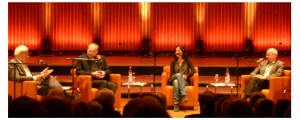„The atomic bomb is supposingly safer in Iranian than in Pakistani hands“

v.r.n.l.: Stephan Lohr, Prof. Thomas Bauer, Dr. Naika Foroutan, Prof. Hans-Georg Ebert
The 16th Herrenhäuser Gespräche, initiated by the VolkswagenStiftung and the radio station NDR Kultur, picked out ‚Islam today – a religion in transition‘ as a central theme. The small-sized studio of the NDR broadcasting centre located at the Rudolf-von-Benningsen-Ufer is packed. Presumably, a factor not only due to the Finger-Food-Buffet in connection with the discussion.
It becomes obvious real soon that Islam has become a ‘hot topic’ within recent years. Within the discussion the assumption is quickly statistically approved by Dr. Naika Foroutan from Humboldt-University of Berlin: An analysis of German publications on ‚Islam‘ or ‚Muslime‘ as a topic since 1961 shows a „substantial rise in publications since the 90s. After 2006 literature on the subject increased tremendously“, according to Foroutan. The ‚Peaks‘ mentioned are traced back by the social scientist to the downfall of the ‚Cold War‘ (East-West-Conflict) on the one hand and to the initiation of the Islamic Conference in 2006 on the other hand.
Prof. Thomas Bauer, islamic scientist from the university of Münster, presented a similar argumentation. Bauer analysed articles from the magazine ‚Der Spiegel‘ and found out that the word ‚Islam‘ appeared in an article for the first time in 1979 in course of the Iranian Revolution. „The image of Islam deteriorated in the public mind since then significantly, especially when the Eastern Bloc vanished as a concept of the enemy. Islam replaced this concept and the attempt of 9/11 fueled that picture“, the renowned Islamic scientist explains.
Prof. Hans-Georg Ebert from the university of Leipzig added that an Islamization of the region by the West has taken place: „Action is always regarded as action of a Muslim.“ The West should put some trust in the people of those countries instead of concentrating on the fight against extremism , the expert for Islamic law suggested.
The debaters shared this point of view that there are still two factors that can be hold responsible for the negative image Islam suffers from in Germany. On the one hand, that is the representation of historical occurences from a Eurocentric perspective which can still be found in school books. „The historical reworking was determined by exchange and war for a long time. Now it is dominated by compartmentalization“, Bauer notice. In addition to that the concealment of positive encounters with Islam and its reception should be mentioned. As an example Bauer mentioned the non-existing dispute on the impact respectively the negation of the same that Arabic literature had on the development in Spain and Italy. On the other hand it is the incorrect, since rarely defined, and the inconsiderated use of terms such as ‚jihad‘ or ‚Shari’a‘. „Shari’a“, Ebert explains, „stands for the bans and rules Muslims have to obey for a life agreeable to God. Jihad stands for the „commitment for the sake of God and is not reduced, as often depicted by the media, to the military“, Ebert substantiated.
Bauer gave some more examples on these assumptions. A cross-national and cross-societal ‚Islamic Culture‘, ranging from Mauretania to Indonesia, does not exist. Unfortunately, he did not find a better and more precise term for that region than the name of ‚Muslim World‘ so far. He labeled the negation of changes and developments within Islam as a religion in the public eye ‚problem of the own apperception‘ .
Applied to the German perspective Foroutan suggested that there should not only be requirements but also (municipal) offers for Muslims. The existing ones do not match social reality yet.
Summing up the discussion Bauer notes: From a geopolitical point of view the concept of the enemy Islams is still needed. Concerning the dispute on the atomic bomb between the West and Iran, he says that “the atomic bomb is much safer in Iranian than in Pakistani hands.”
The recording of this Herrenhäuser Gespräch will be broadcasted on October 7th, 2012 at 8 p.m. on NDR Kultur.
Further readings:
- Prof. Hund: Rassismus im Kontext
- Prof. Waldenfels: Topopgraphie des Fremden
- Friedrich-Ebert-Stiftung: „Vom Rand zur Mitte“
